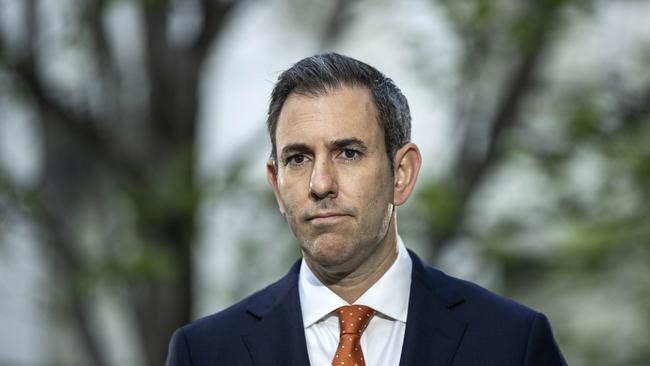Lack of cyber funding ‘a joke’, executives say
The data of millions has been stolen and companies are reeling, yet Labor’s budget failed to invest in cyber protection, experts say.

Business
Don't miss out on the headlines from Business. Followed categories will be added to My News.
Australian cyber security executives have criticised the relative lack of new funding for the sector in Tuesday’s budget, with one describing it as “a joke”, as some of the nation’s largest companies try to limit the damage after the sensitive data of millions of their customers was stolen.
The Albanese government announced $12.6m to combat scams and online fraud, as well as a further $31m to extend its 12-month cyber hub pilot program, as Optus and Medibank recover from major cyber breaches. The Australian Information Commissioner will receive a $5.5m funding boost over two years to investigate and respond to the Optus data breach.
Ajay Unni, chief executive of cyber security provider StickmanCyber, described the meagre amount of new funding as laughable.
“How many breaches need to occur before the government realises the seriousness of cyber security?” Mr Unni asked.
“Penalties are not a deterrent for these breaches if there is a lack of standards and knowledge that leads to these insufficient practices in the first place.

“$12.6m over four years to protect tens of millions of consumers, is a joke. How is that going to make a dent? That funding is to combat scams and online fraud, with the bulk going towards a National Anti-Scam Centre. This won’t go far, which is a missed opportunity.”
More funding for consumer education around digital safety, rather than harsher fines, would help ensure Australians have a better basic understanding of cyber safety principles, particularly given breaches are the result of human error.
“With Australians’ data at risk, there needs to be a look at the bigger picture here, not haphazard funding for government departments and increased penalties for corporates,” he said.
“The government should be helping to protect consumer data by enforcing businesses to invest in a minimum level of cyber security. This could be either tax deductible or come with a rebate for any organisation that is dealing directly or indirectly with consumer data.”
Chris Vein, CEO of industry group the Australian Computer Society, said the government’s measures around TAFE places, support for advanced manufacturing, boosted NBN spending and revamped industry programs were welcomed by everyone in the tech sector.
“While we would have liked to have seen more tech focused measures, we have long been advocates of boosting the technology sector’s diversity,” he said. “Enabling parents to enter, or get back into the workforce is an important step in allowing this.”

Kate Pounder, chief executive of the Tech Council of Australia, a lobby group formed around a year ago from heavyweights including Google, Atlassian and Afterpay, said she was concerned about the cut to the women’s tech workforce reskilling initiative.
The government will save $3.9m over two years by nixing the Supporting Women’s Mid-Career Transition into the Tech Workforce program that it inherited from the former government.
“We believe keeping a focus on the role of women in the tech sector is absolutely critical if we are to meet our shared goal with government of meeting 1.2 million jobs by 2030,” Ms Pounder said.
“Women comprise only a quarter of the tech workforce, despite these roles being among the fastest growing, most flexible and secure jobs in the country, with half the gender pay gap of other high-paying industries. So, we are disappointed to see funding cut to a program which had the potential to help improve these numbers.”
The reason many women never get the opportunity to enter the tech sector is because women working in Australia today didn’t get the encouragement to study STEM in school or university, she said.
“In fact, in today’s existing workforce, according to our research, more women enter the tech workforce after the age of 25 than before the age of 25. Our research also shows that reskilling is a key pathway to get them into these jobs. Our sector offers incredible opportunity for women and we look forward to working with government to find a solution to address this crucial issue.”
“While we support the government’s broader efforts to increase women’s workforce participation, including the $5.8m over five years to support women in science, technology, engineering and maths (STEM) through the Women in STEM and Entrepreneurship program, we simply don’t agree that it is wasteful to support women to re-skill into high-skilled, high-paid jobs.
“We are pleased to see the government follow through on its election commitment to establish the $15bn National Reconstruction Fund which acts as the vehicle for the previously announced $1bn Critical Technologies Fund, which if designed well, will play a vital role in addressing funding gaps in the tech sector.”
Milan Cooper, chief executive of anti-money laundering technology company First AML, said the government has missed a golden opportunity to demonstrate the seriousness with which it is handling a spate of money laundering controversies across industries ranging from casinos to gold and silver refineries.

“The fact that there is no mention of money laundering, AUSTRAC, terrorism financing, beneficial ownership or transparency in the Budget Papers for October 2022 clearly demonstrates that the risks of money laundering in this country are not a priority for our government,” he said. “It’s putting a target on Australia’s back.
“The Labor government has decided to focus the funding of the Attorney-General’s Office on other matters, including the funding of the new National Anti-Corruption Commission and extra support for the Office of the Information Commissioner to investigate the recent Optus data breaches.
“We hope that, at least, part of this anti-corruption commission’s remit is to address the government’s glaring lack of ethics and willingness to turn a blind eye to money launderers across every part of the economy, especially when it fills the state coffers through casinos and pokies.”
More Coverage
Originally published as Lack of cyber funding ‘a joke’, executives say





